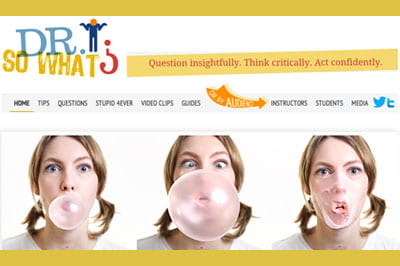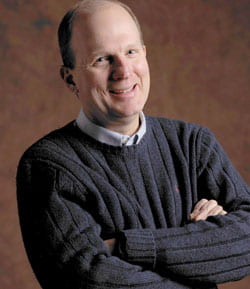New site, enduring concept: Clampitt’s “So What?” continues to inspire
 Students who take a course from UW-Green Bay Prof. Phillip Clampitt — known in the Communication program lexicon simply as “a Phil class” — know that sooner or later, they’ll hear it.
Students who take a course from UW-Green Bay Prof. Phillip Clampitt — known in the Communication program lexicon simply as “a Phil class” — know that sooner or later, they’ll hear it.
They might not always enjoy being on the receiving end of the phrase that means they need to go deeper, think harder, give more. But the potential makes them think critically, prepare like crazy, and ultimately learn to ask questions in new ways — ways they’ll take with them through their UW-Green Bay career and beyond.
“So what?”
It’s a simple phrase, to be sure, but one that’s had incredible impact on Clampitt’s students since he started teaching at UW-Green Bay in 1981. Now, this fundamental but crucial query, along with its six partner questions, is the basis for a new website — www.drsowhat.com — that’s urging a broader audience to “Question insightfully. Think critically. Act confidently.”
“Too many people, even in today’s media, will get on television and have a debate — and all they do is make an assertion with no proof,” said Clampitt, the newly installed John P. Blair Endowed Chair in Communication. “Well, that’s question number one — do you have evidence to back up your claim? Maybe you just think the louder you scream, the louder you talk, the more persuasive you are.
“And nothing could be further from the truth, for somebody who believes in thoughtful discourse and critical thinking.”

Prof. Phillip Clampitt
Clampitt has long extolled those virtues in his courses, with the idea for the Dr. So What site evolving from what are broadly known as “Phil’s seven questions” — lines of inquiry based on implications, effectiveness, ethical impact, assumptions, evidence, patterns and alternatives.
Working with current and former students, Clampitt created the Dr. So What site to illuminate and illustrate those questions, offering video examples, tips and guides for instructors, students and the news media. There’s even a ‘Stupid 4Ever’ tab that takes issue with the common assertion that “there’s no such thing as a stupid question,” and encourages site visitors to vote for their favorites and submit their own examples.
Next steps for the site include collecting tips and creating guides, such as “Dr. So What’s Guide to Critical Thinking” and “Dr. So What’s Guide to Problem Solving,” and offering them as eBooks.
For students who have taken their share of “Phil classes,” the seven questions, and the “so what?” of it all have had lasting impacts. Just ask Kathrine Giacchino, a 1996 Communication Processes grad who holds a major management position at Rubicon International, a Portland, Ore.-based education software company. Given the chance to create her own title, Giacchino chose “Foreman of Fundamental Questions,” a nod to the courses — and professor — that changed the way she works and thinks.
“What the questions come down to for me is, I’m building relationships,” said Giacchino, who regularly uses the septet of queries in her personal and professional life. “I’m not just telling, I’m not just asking — but from the questions, I’m developing relationships.”
So too is Adam Halfmann, a 2007 UW-Green Bay grad who helped Clampitt conceptualize and develop the DrSoWhat site. Now the Assistant Athletic Director for Marketing and Promotions with UW-Green Bay Phoenix Athletics, Halfmann continues to draw on his “Phil class” days, and the lessons learned therein.
“They’re a structure to your presentation; they’re a structure to your paper,” Halfmann said. “Ultimately, they do become how you think. I find myself saying them, if you ask my interns…. It just becomes a perspective change, a difference in how you see things.”
And a timeless one, at that.
“There was no social media — there wasn’t even email when I started,” Clampitt said. “But I can apply those kinds of questions because they’re universal, and they’ll last forever.”
To which no one can rightly say, “so what?”




